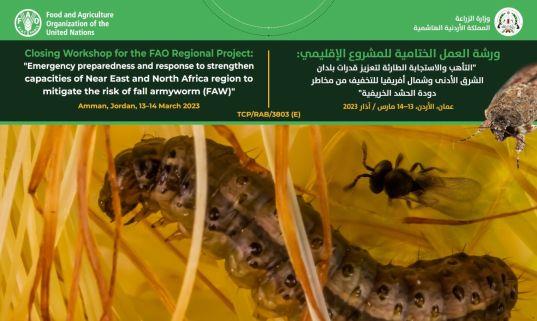Closing Workshop for the FAO Regional Project: “Emergency preparedness and response to strengthen capacities of Near East and North Africa region to mitigate the risk of fall armyworm (FAW)" TCP/RAB/3803 (E)
Hybrid Event, 13/03/2023 - 14/03/2023

Fall Armyworm (FAW) is one of the most serious pests that attack many economically important crops. FAW is a transboundary insect pest that can feed on more than 80 plant species. In 2016, only six African countries reported this insect pest; but today, 79 countries in Africa, the Near East, Asia, and the Pacific are reporting the FAW. In the NENA region alone, 12 of 17 countries have reported the occurrence of the FAW. FAW’s negative impacts include yield losses worth an estimated USD 9.4 billion per year in Africa alone. It has a direct impact on the socioeconomic level by lowering food and income. It increases global food insecurity, malnutrition, and poverty among smallholder farmers. FAO has mobilized resources to combat the fall armyworm and reduce the risk of its spread in many regions, including the NENA region.
The main objectives of TCP/RAB/3803 (E) were to increase the resilience of livelihoods to threats and crises in target countries by supporting, surveillance, monitoring, early warning, and sustainable management and to reduce the impact of the Fall Armyworm on target countries in terms of crop losses, farmers’ income, and food security.
The participating countries are Jordan, Lebanon, Palestine, and Syria, which all share the same common issues of concern for food security and the threat of transboundary plant pests.
Building on the above, the closing workshop for this project is taking place on the 13th and 14th of March in Amman, Jordan.
The event will focus on presenting the project’s various activities that took place and their outcomes from the participating member countries.
This workshop is an opportunity to obtain recommendations to move forward with FAW reduction in the NENA region and exchange cross-country experience.
The objectives for the workshop are to present the country achievements from Jordan, Syria, Lebanon, and Palestine under the TCP project, the expected outputs are the following,
- The best sound practices of FAW control are discussed and shared.
- Key capacity development needs, and challenges, for FAW control are identified.
- Recommendations for future FAW actions at the national level are outlined
- Recommendations for the next steps on FAW management at the regional level are defined.
